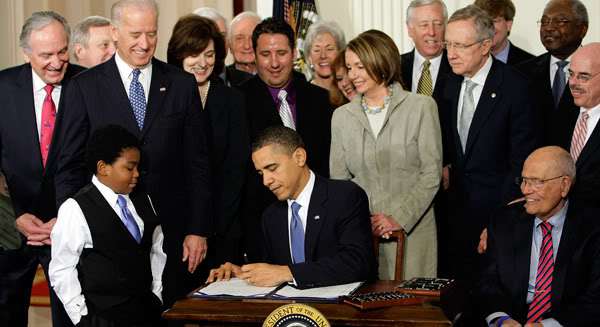
Today, as the Affordable Care Act turns 7 years old, Republicans in Congress will be voting to repeal it. Not because the law does not make great strides in delivering on its promise of providing affordable care to all Americans but because it does deliver on that promise – the number of uninsured Americans is at an all-time low. Without the ACA, 36,000 people a year would die from treatable illnesses and thousands of families would be plunged into medical bankruptcy, forced to choose between caring for a loved one or paying the mortgage. The value of the social safety net has never been “settled law” in America and as long as Republicans are willing to put profits over people, tax cuts over children’s health, deficit reduction over common decency, Democrats will have to keep fighting with everything we have. We may not have political power right now but we have the power of the people behind us.
Here is a reminder of what happened seven years ago.
On March 23, 2010, President Barack Obama signed the Affordable Care Act into law. For over 60 years, Democrats had been trying to pass a law that finally and firmly declared that health care was a right and not a privilege.

This historic piece of legislation was possible because we had Democratic majorities in both houses of Congress and a Democratic president.
It is why Elections Matter … and why all the rest is noise.
Today, I’m signing this reform bill into law on behalf of my mother, who argued with insurance companies even as she battled cancer in her final days.
I’m signing it for Ryan Smith, who’s here today. He runs a small business with five employees. He’s trying to do the right thing, paying half the cost of coverage for his workers. This bill will help him afford that coverage.
I’m signing it for 11-year-old Marcelas Owens, who’s also here. (Applause.) Marcelas lost his mom to an illness. And she didn’t have insurance and couldn’t afford the care that she needed. So in her memory he has told her story across America so that no other children have to go through what his family has experienced. (Applause.)
I’m signing it for Natoma Canfield. Natoma had to give up her health coverage after her rates were jacked up by more than 40 percent. She was terrified that an illness would mean she’d lose the house that her parents built, so she gave up her insurance. Now she’s lying in a hospital bed, as we speak, faced with just such an illness, praying that she can somehow afford to get well without insurance. Natoma’s family is here today because Natoma can’t be. And her sister Connie is here. Connie, stand up. (Applause.)
I’m signing this bill for all the leaders who took up this cause through the generations — from Teddy Roosevelt to Franklin Roosevelt, from Harry Truman, to Lyndon Johnson, from Bill and Hillary Clinton, to one of the deans who’s been fighting this so long, John Dingell. (Applause.) To Senator Ted Kennedy. (Applause.) And it’s fitting that Ted’s widow, Vicki, is here — it’s fitting that Teddy’s widow, Vicki, is here; and his niece Caroline; his son Patrick, whose vote helped make this reform a reality. (Applause.)
I remember seeing Ted walk through that door in a summit in this room a year ago — one of his last public appearances. And it was hard for him to make it. But he was confident that we would do the right thing.
Our presence here today is remarkable and improbable. With all the punditry, all of the lobbying, all of the game-playing that passes for governing in Washington, it’s been easy at times to doubt our ability to do such a big thing, such a complicated thing; to wonder if there are limits to what we, as a people, can still achieve. It’s easy to succumb to the sense of cynicism about what’s possible in this country.
But today, we are affirming that essential truth -– a truth every generation is called to rediscover for itself –- that we are not a nation that scales back its aspirations. (Applause.) We are not a nation that falls prey to doubt or mistrust. We don’t fall prey to fear. We are not a nation that does what’s easy. That’s not who we are. That’s not how we got here.
And we have now just enshrined, as soon as I sign this bill, the core principle that everybody should have some basic security when it comes to their health care. (Applause.) And it is an extraordinary achievement that has happened because of all of you and all the advocates all across the country
~
That bill was passed by Democrats. Not “perfect Democrats”. Democrats. A group of men and women, many of whom put their jobs on the line (and lost them in 2010) because they believed in the core principles of the Democratic party.
Let’s stay strong and united against those who would take healthcare away from 24 million people. And let’s find a way to take back Congress to put up a firewall between those who want to destroy everything good about America and We The People.
When we vote, we win. And when we win, this becomes possible:

That looks pretty nice alongside these other reminders of why Elections Matter:



Only Republicans can watch this video without tearing up:
(What will the Republican health care bill cost you? Learn more at FightWealthcare.com)
Don’t let the destroyers win.
Thread …
Andy Slavitt was the acting administrator for the Centers for Medicare and Medicaid Services from 2015 to 2017 and is an expert on healthcare. He wrote this op-ed yesterday: GOP should slow down and rethink health billGOP should slow down and rethink health bill:
He’s a must-follow on Twitter. I only discovered him about a week ago, and even in that short time, I’ve learned a lot.
Yes, he’s great! I have been following him since the inauguration when he moved from “Obama Administration Healthcare Policy Guy” to “Expert on Twitter”.
The Republicans this morning are scurrying around trying to salvage their signature piece of
craplegislation from defeat. In order to do that they are getting ready to repeal Title I (which includes pre-existing conditions, kids on policies until 26, and no lifetime caps) and to reduce the Essential Healthcare Benefits (EHB) list dramatically.House Republicans May Have Saved Trumpcare by Making It Even Crueler
The question now becomes “will making it crueler make it less palatable to more moderate Republicans”? I guess we’ll find out.
Take the “Republicans are poised to defeat this bill” stories with a grain of salt. They HAVE TO pass it or tRump’s presidency will be irrevocably damaged – and they know it.
That NBC news piece also explained why it might not pass:
From my Senator, Tammy Baldwin, yesterday in an email:
From President Obama earlier Thursday:
https://twitter.com/ASlavitt/status/845055295558705156
Full text of note, courtesy Fortune.
Nancy Pelosi on Thursday’s non-vote:
Good morning, and thank you for the excellent post, Jan!
Just read elsewhere that “Obama and the Congress should have bulled their way to single-payer back in 2010,” and almost choked. Have these people lost their memories? It was hard enough to get the ACA passed, let alone single-payer!
The best we can hope for is that this will be such a fiasco that the House will be replaced in 2018 and we can get to single-payer in the next few years.